
As many of you would know, Volvo started building buses in partnership with Jaico in 2001. In 2007, Volvo Bus Corporation established an Indian entity with 70:30 equity participation between Volvo and Jaico and set-up an independent bus manufacturing facility at Hoskote near Bangalore. Recently on December 6, Volvo Bus Corporation has acquired the 30 per cent stake from Azad Group.
“Witnessing the growth in the bus industry, we have come to a stage where we need to invest more, to grow more. Within the Volvo Bus Corporation, India is today seen, not just to service the Indian domestic market, but also a home market for Volvo Bus Corporation and therefore we are seriously looking at the opportunities in exports to other markets. Keeping that in mind the Volvo Bus Corporation and Azad Group decided to part ways with mutual consent”, Mr. Akash Passey, Managing Director, Volvo Buses India Private Ltd.
With this, Volvo Buses India has become a 100 per cent subsidiary of Volvo Bus Corporation. “It also shows our commitment and the importance given to the Indian market by Volvo Bus Corporation”, Mr. Akash Passey adds.
The company has announced plans for expansion and has set some ambitious growth targets. Mr. Akash Passey says, “In the next five years, we would like to achieve a turnover of $1 billion and sales of 5,000 units per annum. To achieve this, we will increase our manpower strength by 30 per cent over the next two years from the current levels. We will expand our facilities, double the capacity. We are investing more in our facilities as we see that the Indian market has grown and accepted our products well”.
Among the initiatives that Volvo is looking at as part of its expansion in India is a dedicated training facilities for employees, setting-up of customer experience centers across the country and foraying into refurbishment of existing Volvo buses.
Elaborating on each of these, Mr. Akash Passey said: “In the next two years, we will have a Manpower strength of 1,500 to 2,000 people working for the company in India. Hence we are setting up an in-house training to train our own staff. We are also setting five customer experience centers across India in Bangalore, Chennai, Mumbai, Hyderabad and Delhi. These would be one-stop-shop for getting soft offers, repairs and refurbishing. Another important initiative is foraying into refurbish of existing Volvo buses. With over 3,500 buses on road, some of then are more than 8 to 9 years old, customers are looking for refurbishing services, for both interiors and exterior and even on the drivelines. We will start offering these services by mid-2011”.
Exports
As mentioned earlier, Volvo is looking at its Indian bus plant not just to service the domestic market but to cater to its requirement in other global markets as well. Mr. Akash Passey says: “In the next five years, we would like to have 25 to 30 per cent of our revenues to come from exports. The idea is to get into as many markets as possible, Africa, Middle-East and all the neighboring markets, namely, Sri Lanka and Bangladesh”.
He says: “Its been a great year in terms of exports. We have started deliveries of coaches to Sri Lanka and Bangladesh. We have sent the first prototypes to South Africa and the customer response has been very positive. The models are very similar to those we sell in India, but the specs are slightly different. In some markets, the customer is looking at interiors which match European standards. So there is a challenge both in terms of marketing and in production. This will help us upgrade the skill levels in the plant to new levels. In 2010, we will end the year with exports of around 20 to 30 buses and for 2011 our target is 80 to 100 buses”.
Volvo has witnessed a very steady growth in the Indian bus business. In 2009, the company sold around 530 buses, which includes both city buses and coaches, and for the current year it hopes to the end the current year with sales of 560 buses. In 2009, the growth was primarily because of the city buses, thanks to the JnNURM order. “In 2010, the coach market has come back, particularly the acceptance for our multi-axle coaches has been very good. In fact, 90 per cent of our key customers, including institutional and private customers, have moved to multi-axle buses”, says Mr. Akash. Although the growth in terms of numbers are from 530 to 560 buses this year, there is much higher increase in turnover due to the increase in sales of multi-axle buses.
Recently, Volvo Buses has received its largest order in India to date, for 100 Volvo 9400XL multi-axle coaches from Vijayanand Road Lines Logistics (VRL). The coaches will be delivered during 2011 and the order is the largest to date in India in terms of order value.
Mr. Akash Passey says: “The India bus market is maturing. When Volvo first entered the bus market, we had a lot of big and small operators who came into this business. Today, operators have realised that you need a particular size and scale of operations to run this business. The 100 multi-axle bus order from VRL clearly indicates the direction in which the market is headed. The coach segment is expect to grow significantly in the coming years and so does the city bus segment”.
In the city segment, Volvo buses are running in over 12 cities with over 1,200 buses on road. Mumbai’s BEST has recently 2 Volvo buses to its fleet. “The way our cities are growing, our Government can’t stay away. JnNURM was an important step to de-congest the traffic in cities and promote public transport. We expect the government to launch the second phase by 2011-12”, adds Mr. Akash Passey.
Volvo recently launched the new Euro 4 compliant city buses and earlier this year launched the CNG version. Currently, field trials are on in Delhi for the city buses which will be complete by May next year and deliveries will started by 2nd or 3rd quarter of 2011.
Volvo had initially invested nearly Rs. 100 crores in setting up of the new bus manufacturing facility. For the current phase of expansion, the company is planning to invest an equal amount over the next couple of years.
